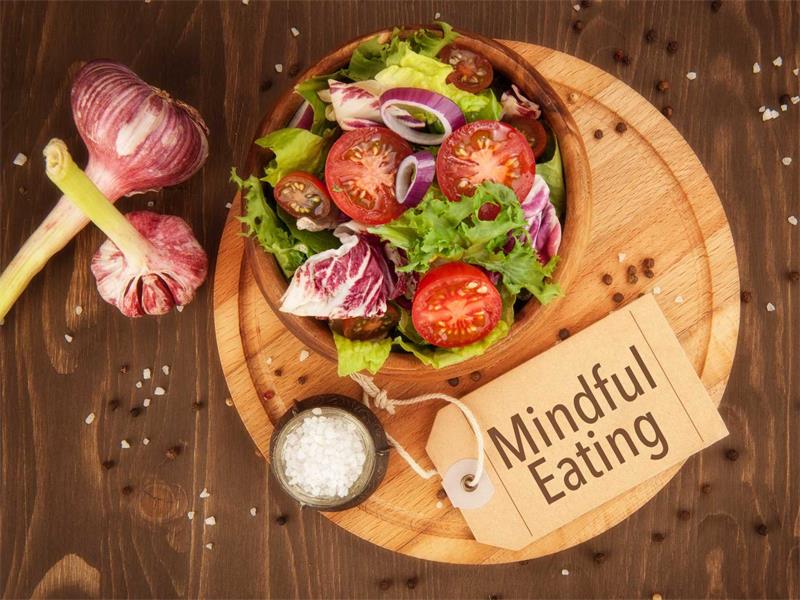Contents
The Benefits of Mindful Eating for Better Digestion
Digestion is a vital process that helps our bodies absorb nutrients from the food we eat. However, many people encounter digestive problems such as bloating, constipation, and gas due to poor eating habits.
This is where mindful eating can help. Mindful eating is all about paying attention to your food and the experience of eating it.
It’s a practice that encourages you to slow down, engage your senses, and listen to your body’s signals. One of the main benefits of practicing mindful eating is improved digestion.
When you eat mindfully, you’re more likely to chew your food thoroughly, which makes it easier for your body to digest. This can help reduce bloating and other digestive discomforts.
Additionally, when you pay attention to how certain foods make you feel after eating them, you can identify any intolerances or sensitivities that may be causing digestive issues. Beyond digestion benefits, mindful eating can also promote overall health and well-being.
By savoring each bite and taking time to appreciate the appearance and aroma of your food, you’re more likely to enjoy a satisfying meal without overeating or feeling deprived. Mindful eaters are less likely to consume processed foods high in sugar and fat that can cause inflammation in the body leading to chronic diseases like obesity or type 2 diabetes.
Digestion plays an essential role in our overall health; therefore practicing mindful eating techniques benefits not only our immediate gut health but also our long-term health goals. The combination of slowing down while enjoying all aspects of mealtime enhances not only enjoyment but reduces stress as well; ultimately resulting in healthier choices regarding nourishing ourselves with whole foods rather than processed junk food that causes inflammation within the body leading to chronic lifestyle diseases.
Slow Down and Savor Your Food
Take time to appreciate the appearance, aroma, and taste of your food
Do you often find yourself shoveling down food without even noticing its taste or texture? If so, you’re not alone. In our fast-paced society, it’s easy to fall into the trap of rushing through meals.
However, taking the time to appreciate the appearance, aroma, and taste of your food can be incredibly beneficial for your digestion. Before digging in, take a few moments to really look at your food.
Notice its color and texture. Take in its aroma.
Then take a small bite and let it sit on your tongue for a few seconds before chewing. As you chew, pay attention to the different flavors and textures that come through.
Chew your food thoroughly before swallowing
How many times do you typically chew each bite before swallowing? If you’re like most people, it’s probably not very many. However, chewing thoroughly is essential for proper digestion.
When you don’t chew enough before swallowing, larger pieces of food enter your stomach which can cause indigestion and discomfort later on. Chewing breaks down food into smaller pieces which makes it easier for stomach acid to further break it down and fully digest it.
Aim to chew each bite at least 20-30 times before swallowing. This may seem like a lot at first but with practice becomes easier over time.
The Benefits of Slowing Down Your Eating
Taking the time to slow down while eating has numerous benefits beyond just improving digestion. Slowing down allows us to fully enjoy our meals by savoring their flavors and textures. It also gives our bodies more time to register fullness signals which prevent overeating.
Additionally slowing down can reduce stress levels by allowing us a moment of calm during busy days. So next time you eat, put your phone away, turn off the TV and enjoy the moment by slowing down and savoring your food.
Pay Attention to Your Body’s Hunger Signals
One of the main principles of mindful eating is paying attention to your body’s hunger signals. This means eating when you’re hungry and stopping when you’re full. It sounds simple, but many people don’t truly understand what it means to be hungry or full.
When you’re hungry, your body sends physical signals like stomach growling or feeling light-headed. It’s important to listen to these signals and respond accordingly, rather than eating out of habit or boredom.
On the other hand, stopping when you’re full means paying attention to how your body feels after each bite. You should feel satisfied but not stuffed or uncomfortable.
Eat When You’re Hungry, Stop When You’re Full
To practice mindful eating based on hunger signals, start by tuning into your body and asking yourself if you’re truly hungry before reaching for food. If you are genuinely hungry, make sure to eat slowly and savor each bite.
Pay attention as you eat so that you can recognize when you feel satisfied – this is the point at which it’s time to stop. It can be difficult at first because we often eat for reasons other than hunger – out of boredom, stress or emotional reasons – but with practice and patience, it becomes easier over time.
Avoid distractions while eating (TV, phone, etc.)
Eating mindfully also involves eliminating distractions while eating so that we can focus on our bodies and tune into our hunger cues more effectively. This means turning off the TV, putting away your phone and any other distractions that could take your attention away from what’s right in front of you.
By doing this we will be able to fully concentrate on our food as well as pay more attention to our bodies’ responses during meals which leads us towards a better digestion process in the long run. By following these simple yet effective tips, you’ll be able to tune into your body and learn to eat according to its needs.
This mindfulness will help you improve your digestion and overall health while allowing you to enjoy your meals more fully. Remember, mindful eating is not about restriction or depriving yourself – it’s simply about being present and paying attention.
Choose Nutrient-Dense Foods
Focus on whole foods that nourish your body
Eating whole, nutrient-dense foods is crucial for proper digestion and overall health. These foods are rich in vitamins, minerals, fiber, and other essential nutrients that our bodies need to function at their best.
Some examples of nutrient-dense foods include fruits, vegetables, whole grains, nuts and seeds, lean proteins such as chicken or fish, and low-fat dairy products. When choosing your meals for the day or week, try to focus on incorporating as many whole foods as possible.
For example, instead of reaching for a sugary cereal in the morning, try making oatmeal with fresh fruit and nuts. Instead of grabbing a bag of chips from the vending machine for a snack, opt for some sliced veggies with hummus or a piece of fresh fruit.
Avoid processed foods that can be difficult to digest
Processed foods are often high in added sugars and unhealthy fats which can lead to inflammation in the gut and digestive issues such as bloating and discomfort. They are also often stripped of important nutrients during processing which can lead to nutrient deficiencies over time.
To improve your digestion and overall health it is important to limit your intake of processed foods as much as possible. This includes fast food meals like burgers or fries; packaged snacks like chips or cookies; sugary drinks like soda; and highly processed meats like hot dogs or deli meats.
Instead of relying on these types of convenience food options try cooking at home more often using natural ingredients whenever possible. Not only will this be better for your digestive system but it can also be more cost-effective in the long run.
Making healthy choices easy: meal prep ideas
Making mindful choices when it comes to eating can sometimes feel overwhelming especially if you’re used to relying on processed convenience foods. One way to make it easier is to do some meal prep at the beginning of the week.
This might involve cooking a big batch of healthy meals on Sunday that you can portion out for the rest of the week, or simply chopping up veggies and packing them into individual containers for easy snacking throughout the day. Whatever method works best for you, taking some time to plan ahead can help ensure that you have plenty of whole, nutrient-dense foods on hand when hunger strikes.
Mindful Portion Control
Use Smaller Plates and Utensils
When it comes to eating, sometimes we think we need a large plate or utensil to feel satisfied. But in reality, using a smaller plate and utensil can help with mindful portion control. This is because our brains are wired to associate the size of our plate or utensil with how much food we should eat.
By downsizing these items, you’ll be tricking your brain into thinking you’re eating more than you actually are. Another benefit of using smaller plates and utensils is that it can help with food waste.
If you’re someone who feels guilty about leaving food on your plate, using a smaller one will naturally limit the amount of food you put on it in the first place. Plus, if you still have room for seconds, you can always go back for more!
Listen to Your Body’s Signals Instead of Finishing Everything on Your Plate
We’ve all been taught to finish what’s on our plates since childhood. However, this habit can lead us to ignore our body’s signals when we’re full and lead to overeating.
Mindful eating means listening to your body’s signals and stopping when you’re satisfied—not necessarily when your plate is empty. One way to practice this is by taking breaks during meals.
Put down your fork or spoon between bites and check in with yourself—do you feel comfortably full? Are there any hunger pangs left?
If not, it’s okay to stop eating! Remember that it takes about 20 minutes for your brain to register that you’re full, so take things slowly.
Another tip is to pay attention to how often you eat out of boredom versus actual hunger. If you find yourself reaching for a snack even though you don’t feel hungry, try finding another activity instead like taking a walk or doing a puzzle.
This will help you better tune into your body’s hunger signals and avoid mindless snacking. Mindful portion control means paying attention to the amount of food you’re consuming and stopping when you feel satisfied—not necessarily when you’ve cleaned your plate.
By using smaller plates and utensils and listening to your body’s signals, you’ll be well on your way to practicing mindful eating habits that benefit both digestion and overall health. So, start practicing today with these simple tips!
Mindful Eating Habits Outside of Meals
Snack Mindfully by Choosing Healthy Options and Avoiding Mindless Snacking
Eating mindfully doesn’t just apply to meals – it’s important to be mindful of your snacking habits as well. When choosing snacks, opt for healthy options like fruits, vegetables, and nuts that will provide your body with nutrients and sustained energy.
Avoid reaching for sugary or processed snacks that can cause a spike in blood sugar levels and leave you feeling sluggish. It’s also important to be aware of mindless snacking.
This is when you snack out of habit or boredom rather than actual hunger. To prevent this, try to identify the triggers that lead you to snack mindlessly.
For example, maybe you tend to snack while watching TV or working at your desk. Once you’ve identified these triggers, try replacing them with healthier habits like taking a walk or doing some stretches instead.
Practice Gratitude for the Food You Have
Practicing gratitude is an important aspect of mindful eating outside of meals. Take a moment before eating any meal or snack to express gratitude for the food on your plate and the individuals who helped bring it there – from farmers who cultivated the crops to grocery store employees who stocked the shelves.
By expressing gratitude for your food, it can help shift your mindset from one of scarcity (e.g., “I wish I had something else to eat”) to one of abundance (e.g., “I am grateful for this healthy meal”). This shift in mindset can help you make more mindful choices about what foods will nourish and sustain your body rather than simply satisfying cravings.
Incorporating mindfulness into snacking habits outside of meals can help improve digestion and overall well-being by creating a healthier relationship with food. Try implementing these tips into your daily routine slowly but surely – start small and work your way up to making more mindful choices.
Conclusion
Practicing mindful eating can do wonders for your digestion and overall health. By taking the time to slow down and savor your food, paying attention to your body’s hunger signals, choosing nutrient-dense foods, and practicing mindful portion control, you can improve your digestion and feel better in general.
Not only does mindful eating help with digestion, but it can also lead to a healthier relationship with food. By focusing on nourishing your body instead of simply satisfying cravings or emotions, you can make better food choices and feel more in control of your eating habits.
Remember that mindful eating is not about being perfect or restrictive. It’s about being present in the moment and enjoying the experience of nourishing your body.
So next time you sit down to eat, take a few deep breaths, put away any distractions, and savor each bite. Your body (and mind) will thank you!













